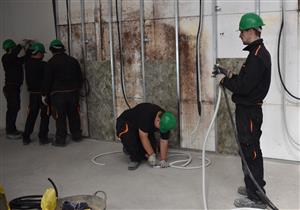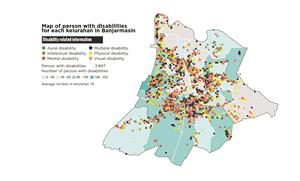Search Results
Search
Filter results
Advanced Filters
Your search returned 883 Solutions
-
Integrated employment model
SPAGAT is a model for the integration of persons with severe disabilities into the employment world. SPAGAT provides support for, accompanies and finds work for such persons in the primary labour market. Companies pay for the actual work; the difference in productivity is subsidised by the provincial government, as are the mentors’ costs.
ifS - Institute for Social Services Vorarlberg, Integrated employment model, Austria -
28-week employment training programme
LetsCo! organizes long-term trainings (one day every two weeks for 28 weeks), including traineeships in regular working environments such as for-profit companies (as co-workers), in kindergartens, and in elderly care centres. As a result, participants develop professional skills and discover their talents, and areas in need of improvement.
Konekt vzw, Belgium -

Moving inactive people with disabilities from social services to employment
A multidisciplinary team provides training, support, and internship opportunities to inactive youth with intellectual or psychosocial disabilities. Between 2017 and 2019, One-on-one has been working with 228 employers and supporting 2,054 people with disabilities to transition to employment.
ONCE Foundation, One-on-one, Spain -

Participatory collection of disability data in cities to improve public service
Kota Kita, an NGO from Solo City, Indonesia, generates a disability-inclusive profile of cities by collecting differentiated data in real time using a geo-tagging app. By involving people with disabilities, the results provide a basis for cities to take action to make them more disability-friendly.
Kota Kita, Participatory Approach for Disability-Inclusive Cities Indonesia/Disability-Inclusive Cities Indonesia, Indonesia -
Personal development through employment
Samhall is a state-owned company assigned to provide Meaningful work that furthers the personal development of people with disabilities. In 2013, 20,000 people were employed in 250 localities throughout Sweden and a total of almost 25,000 had been able to take the next step to a job with another employer.
Samhall, Personal development through employment, Sweden -
Felting and knitting skills as the key to self-employment
EPSA produces and sells a variety of felting and knitting products made by young women with disabilities. Participants in their vocational training are provided with meals and accommodations. Since 2009, almost 400 young women have benefited from being trained and equipped to work on a self-employment base.
EPSA - Entire Power in Social Action, Employment programme for young women with physical disabilities., Nepal -
Promoting an inclusive workplace
Wipro’s Equal Opportunity Policy is comprehensive and ensures that inclusion becomes an integral part of culture and working. Wipro’s hiring policy for persons with disabilities is merit-based across all roles. Implementation of practice of inclusion is across 130,000 employees working in over 56 countries.
Wipro Ltd., Promoting an inclusive workplace, India -

Two restaurants run by persons with disabilities
"Ízlelő Restaurants" are adapted to the needs of employees, with special work procedures and ongoing training. The first restaurant was opened in 2007, and 46 people with various disabilities are now employed in two restaurants and the model has been developed into a social franchise handbook.
Kek Madar Foundation, Ízlelő restaurants – Tasty restaurants, Hungary -
Support in transition to adult life
The School-to-Community Transition Initiative aims to improve the quality of transition planning and transition services for people with intellectual and developmental disabilities. This goal is achieved by identifying successful programmes that can be replicated nationwide within The Arc’s network of local and state chapters.
The Arc of the United States, Support in transition to adult life, United States of America -

The Living Link: Creating Abilities from Disabilities
To enhance the potential of intellectually disabled adults The Living Link developed a one-year Adult Integration Programme, which consists of teaching essential work readiness and life-skills, providing work training and experience and attending a five-day "Independent Living tour," during which newly learned skills are applied and assessed.
Living Link, South Africa
- Page 1
- Page 2
- Page 3
- Page 4
- Page 5
- Page 6
- Page 7
- Page 8
- Page 9
- Page 10
- Page 11
- Page 12
- Page 13
- Page 14
- Page 15
- Page 16
- Page 17
- Page 18
- Page 19
- Page 20
- Page 21
- Page 22
- Page 23
- Page 24
- Page 25
- Page 26
- Page 27
- Page 28
- Page 29
- Page 30
- Page 31
- Page 32
- Page 33
- Page 34
- Page 35
- Page 36
- Page 37
- Page 38
- Page 39
- Page 40
- Page 41
- Page 42
- Page 43
- Page 44
- Page 45
- Page 46
- Page 47
- Page 48
- Page 49
- Page 50
- Page 51
- Page 52
- Page 53
- Page 54
- Page 55
- Page 56
- Page 57
- Page 58
- Page 59
- Page 60
- Page 61
- Page 62
- Page 63
- Page 64
- Page 65
- Page 66
- Page 67
- Page 68
- Page 69
- Page 70
- Page 71
- Page 72
- Page 73
- Page 74
- Page 75
- Page 76
- Page 77
- Page 78
- Page 79
- Page 80
- Page 81
- Page 82
- Page 83
- Page 84
- Page 85
- Page 86
- Page 87
- Page 88
- Page 89